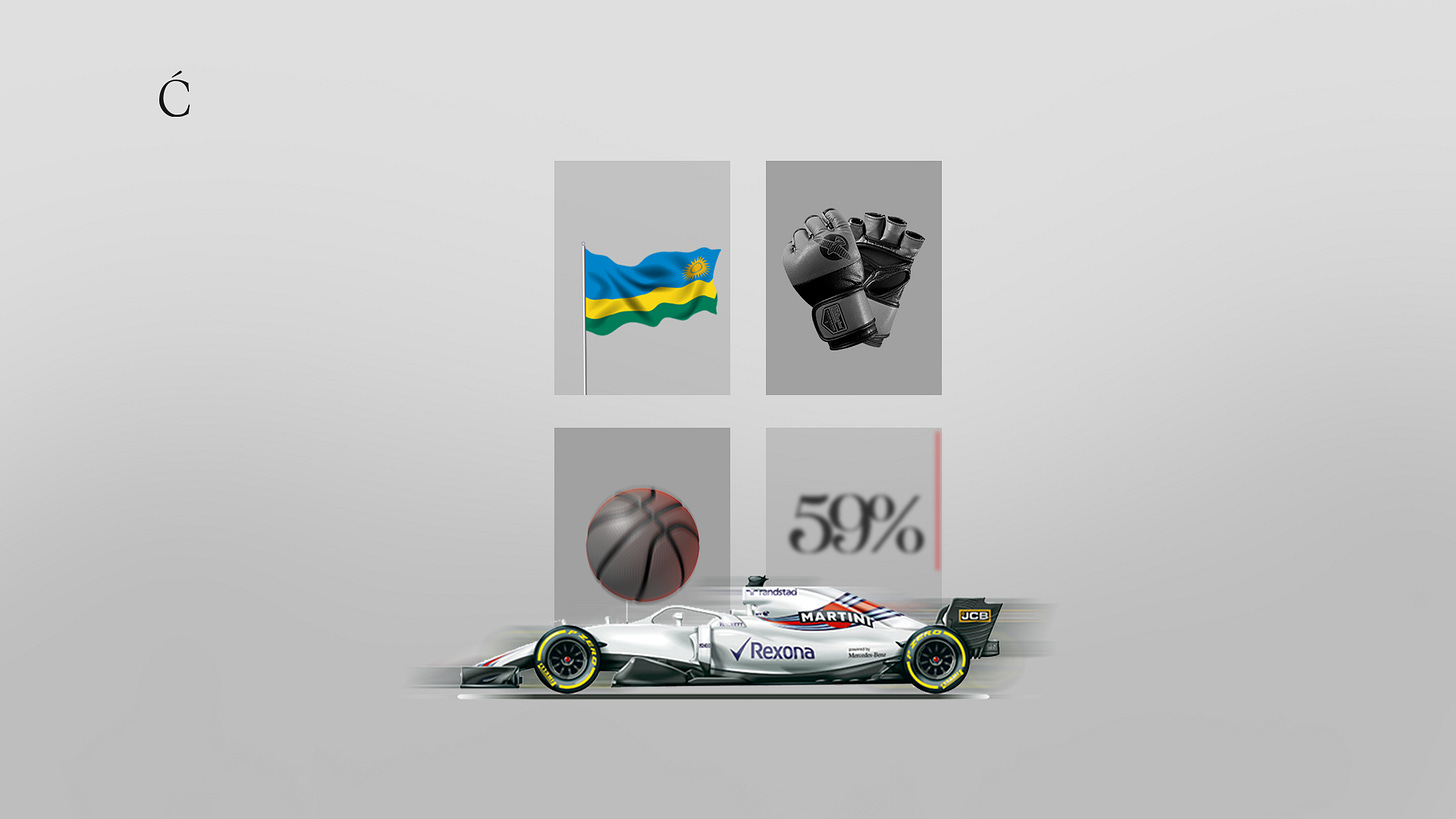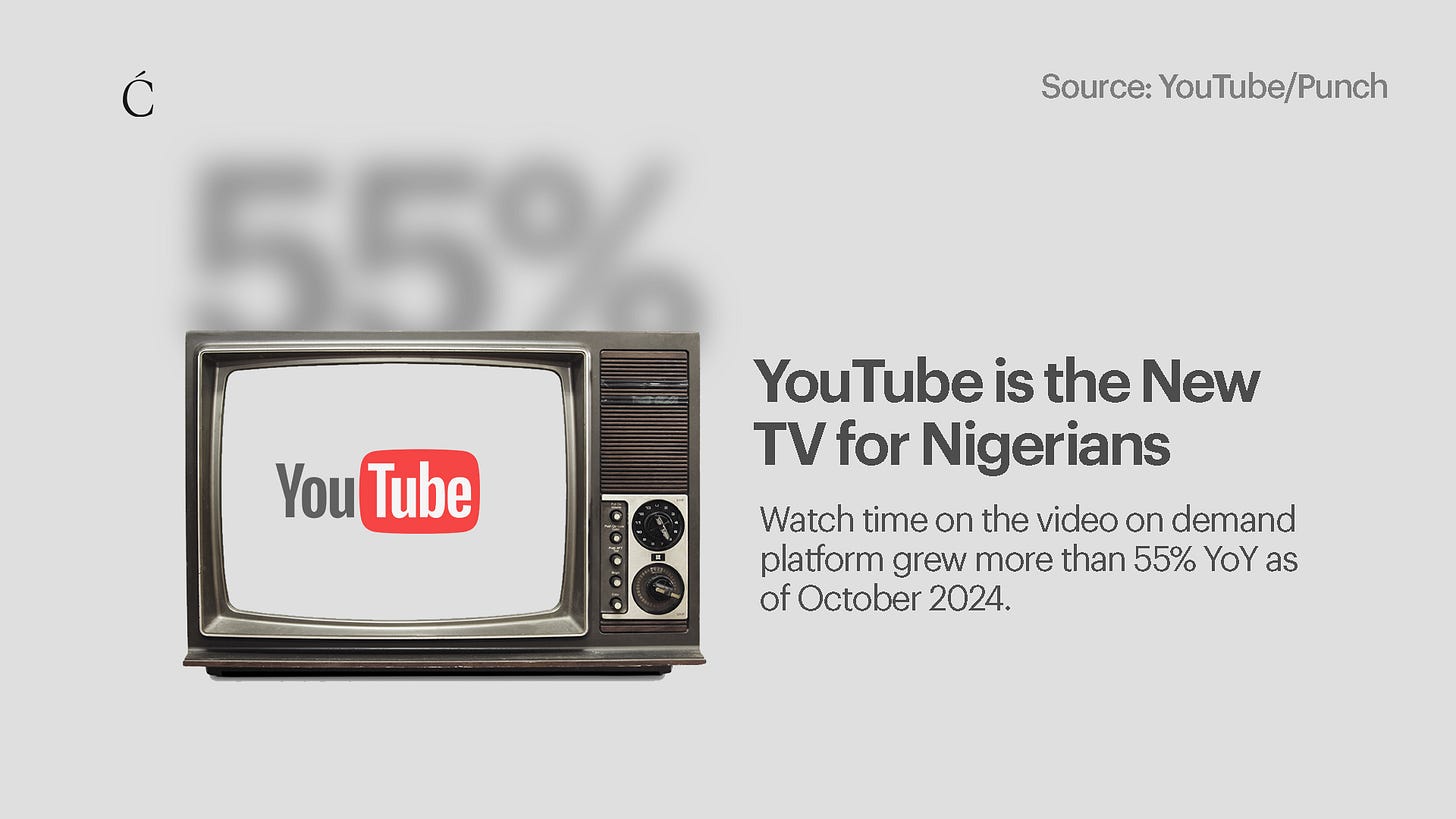Rwanda’s big bets on sports + YouTube woos Nollywood
YouTube makes a play for Nigerian filmmakers, Rwanda doubles down on sports as soft power, and NCC takes stock of three years of telecom policy.
Hello there!
In today's Digest, we discuss
Rwanda’s continued focus on growing its sports industry.
YouTube’s latest move to woo Nigerian filmmakers
A report on the impact of the Nigeria Communications Commission’s interventions in the last three years.
Centre Spread 🗞️
Rwanda’s bromance with sports grows stronger
On Monday, August 25, 2025, the Professional Fighters League announced that the four semifinal bouts of its flagship mixed martial arts (MMA) tournament, PFL Africa, will take place on October 18 at BK Arena in Kigali, Rwanda.
Hosting the event, Africa’s biggest MMA competition, adds to Rwanda’s growing reputation as a premier sports destination. Kigali’s BK Arena has staged four of the five Basketball Africa League finals since the league’s launch. The country also hosted the 2024 FIA Prize Giving ceremony, the first in Africa, and is preparing to stage the UCI Cycling World Championships. Earlier this month, Semafor reported that Rwanda had submitted a bid to host a Formula 1 race in Kigali, which would mark the sport’s return to Africa for the first time since 1993.
Using sports to power tourism and the broader economy has been central to the Kagame government’s strategy. In 2023, Rwanda hosted 59% more sporting events than the previous year, generating over $13 million. Tourism revenues are also rebounding, with visitors spending $267.71 million in the first half of 2024—an 11% increase from 2023. The model has inspired others: DR Congo recently struck sponsorship deals with Barcelona, AC Milan, and AS Monaco, echoing Rwanda’s partnerships with top European clubs.
Still, critics argue the approach amounts to “sportswashing,” raising questions about resource allocation in a developing country, particularly given Rwanda’s human rights record.
YouTube courts Nigerian filmmakers
Last weekend, YouTube hosted Nigerian TV and film producers for a one-day event in Lagos, titled TV/Film Day. The workshop was designed to help creators reach global audiences and build sustainable businesses online. Sessions focused on audience engagement, content optimisation, and global distribution strategies.
The event is the latest in a three-year run of initiatives, including YouTube for Filmmakers 2024, Celebration of Nollywood 2023, and the YouTube Black Voices Fund. These efforts reflect the company’s broader strategy to help African creators capture a bigger share of the global entertainment market.
With YouTube now a fixture on TV screens and not just mobile phones, the initiative also has strategic weight. In February, CEO Neal Mohan identified conquering the living room as one of YouTube’s four “big bets” for 2025, alongside cultural relevance, the creator economy, and AI. At the Lagos event, executives revealed that more than two million Nigerians now watch YouTube on their living room screens. Partnering with filmmakers ensures more local content to fuel that growth.
YouTube remains a default distribution and monetisation platform for Nigerian independent filmmakers. It provides revenue access, widens reach, and grows the company’s content library. Notably, YouTube executives said over 70 percent of views for Nigerian content now come from audiences outside the country, underscoring both Nollywood’s global appeal and YouTube’s role in amplifying it.
Communiqué’s report assessing the impact of the NCC’s policy and regulatory moves in the last three years
Communiqué has released a new report assessing the impact of the Nigerian Communications Commission’s (NCC) policies on the telecom industry over the past three years. The report was unveiled at a webinar hosted by Communiqué on Wednesday, August 27, 2025.
The 90-minute session brought together industry leaders and journalists to review NCC’s progress and challenges. Speakers commended the Commission for its policies, which have enabled capital injection into the industry. CEO of the Institute of Governance and Economic Transformation, Evelyn Dan Epelle, praised its data-driven approach, while Royal Ibeh highlighted spectrum allocation and the rollout of over 7,000 towers. Still, participants cautioned that infrastructure gaps, high costs, and rural exclusion remain pressing concerns. Businessfront’s Head of Content, Emmanuel Paul, noted that consumer education, though improving, must reach more rural audiences.
A major issue raised was vandalism of telecom infrastructure. The chairman of the Association of Licensed Telecommunication Operators of Nigeria (ALTON), Engr. Gbenga Adebayo described it as a critical threat, increasing maintenance costs and disrupting services. He called for stronger deterrents, rapid interventions, and community involvement in protecting infrastructure.
Looking ahead, speakers urged the NCC to anticipate rather than react to challenges. They recommended context-specific solutions, such as wireless alternatives where cable theft is rampant and satellite services in remote areas. Frank Eleanya, Senior Reporter covering the Telecoms industry at TechCabal, stressed that the Critical National Information Infrastructure (CNII) should be passed into law.
Crunch Time 📈
YouTube is the New TV for Nigerians
Catch Up 📬
Communiqué 85: Crea8torium wants to be the classroom for African creators
As content creation becomes a more aspirational and viable career path in Africa, stakeholders have been calling for greater structure and support. Salem King and Adaora Mbelu’s Crea8torium may offer just that. This week’s essay compares the project to the Colin and Samir Show in the U.S. and explores how it evolved.
Here is an excerpt for you:
“Crea8torium is still in its early days, but its ambition is clear. Where most creator-focused platforms in Africa remain scattered, temporary, or tied to corporate sponsorships, Salem King and Adaora Mbelu are building something more permanent, rooted in community. The show may have started as a series of conversations in a studio, but the bigger play is to create an ecosystem where African creators can learn from one another, share data, and begin to professionalise an industry that has long been undervalued.”
Read the full essay here.
Curiosity Cabinet 🗄️
Africa is the world’s fastest-growing tourism market, but its share of the global market remains very small. Chris O. Ogunmodede argues that increasing it depends on plans rooted in local realities, not just attracting Western travellers.
A comprehensive breakdown of the state of investment in Africa's sport and creative industries.
TV commercial and documentary director, Temitope “Oluwadabest” Dada, on how he is learning the business of creativity.
Do you run a startup or organisation at the intersection of creativity, technology, and entrepreneurship in West Africa and beyond? Apply for the Creative Economy Challenge & Awards by D4D Hub & TechCabal to compete for a share of the $30,000 prize pool. Applications close September 3.
Here are the events happening in Africa next week:
03 – 04 September: GITEX Nigeria holds in Lagos, Nigeria
04 - 10 September: Creative Africa Nexus (CANEX) programme at the Intra-African Trade Fair 2025 (IATF20,25) holds in Marrakech, Morocco
05 - 07 September: South Africa's largest literary event, The Open Book Festival kicks off in Cape Town
Explore more of Africa’s creative economy in one place. Communiqué’s African Creative Economy Database tracks 1,000+ companies, events, investors, and government actors across the continent.
That’s it for this week’s Digest. See you next week.




